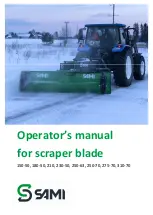
21
USING THE HITCH PLATE
Use only the hitch plate (Refer to Figure 23), for
towing pull-behind equipment (carts, trailers, etc.)
or dragging loads.
Raise the lower links of the three point hitch to their
highest position to prevent interference with the
towed equipment.
IMPORTANT:
When transporting pull-behind
equipment on public roadways, always use a
safety chain to supplement the connection
between the tractor and towed equipment. The
safety chain must have a strength rating equal
to or greater than the gross weight of the equip-
ment being towed.
TRACTOR WEIGHTING
When implements are installed on either the front or
rear of the tractor, the normal balance of the tractor
is altered.
•
As a rear mounted implement is raised to the
transport position, the balance point of the
tractor shifts rearward, which may result in a
loss of steering control and tractor stability.
•
When a front mounted implement is raised, the
balance point shifts forward and may result in a
loss of traction and stability.
To counterbalance these weight shifts, weight
should be added to the tractor in the form of either
front cast iron weights, a rear weight box, and/or
liquid tire ballast. Only enough weight should be
added to obtain good traction, control, and stability.
Excessive weight will unnecessarily load down the
tractor’s engine and transmission.
INSTALL
ONLY
EQUIPMENT APPROVED FOR
USE ON THE 5000 SERIES TRACTOR.
Front Weights
To counterbalance three point hitch mounted
equipment, a weight bracket/bumper kit and cast
iron weights are available from your
Cub Cadet
dealer. Refer to the Weighting Table for the proper
ballast to be added to the front of the tractor.
Weighting the Rear of the Tractor
To counterbalance front mounted equipment, use a
rear weight box, and/or liquid ballast in the rear
tires. Refer to the Weighting Table for the proper
ballast to be added to the rear of the tractor.
NOTE:
Consult with your Cub Cadet dealer about
having liquid ballast added to your tires, and for any
special maintenance after the procedure is
performed. Because special equipment and a
familiarity with the practice is required, only a
qualified tire technician should perform this
procedure.
** If the center of gravity of the additional weight is positioned closer to the rear axle and higher above the
ground, more weigth must be added. If the additional weight is carried farther from the axle and lower, less
weight may be used.
TRACTOR WEIGHTING TABLE
Equipment Installed
on Tractor
Method of Weighting
Weight Required
Front Loader
Rear Weight Box AND Bal-
last Added to Rear Tires
400 pounds in weight box (** with center of gravity approx. 33"
from center of rear axle and 20" above ground-See note below)
AND a 86 pounds of liquid ballast added to each rear tire.
Front Loader and
Appoved Rear Mounted
Equipment
Ballast Added to Rear Tires 86 pounds of liquid ballast added to each rear tire
Rear Mounted Finish
Mower
Front Weight Bracket and
Suitcase Weights
A minimum of four suitcase weights (168 pounds)
Rear Mounted Tiller
Front Weight Bracket and
Suitcase Weights
A minimum of two suitcase weights (84 pounds)
Rear Mounted Blade,
Box Blade, Rake
Front Weight Bracket and
Suitcase Weights
A minimum of two suitcase weights (84 pounds)
Rear Mounted Post Hole
Digger
Front Weight Bracket and
Suitcase Weights
A minimum of four suitcase weights (168 pounds)
Front Snow Thrower
None Required
None Required
Front Blade
None Required
None Required















































